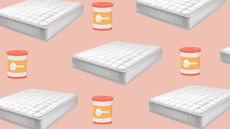Sleep
The latest Sleep breaking news, comment, reviews and features from the experts at Realhomes
-

What is the Scandinavian sleep method? The pros explain this unusual duvet hack
Sleep experts dive into the pros and cons of the game-changing technique
By Eve Smallman Published
-

6 of the best mattress protectors to buy — budget, organic, and cooling options from $12.99
See six of the best mattress protectors, from Casper, Avocado, and more — tried and tested by us. Plus budget-friendly and highly-rated options
By Christina Chrysostomou Last updated
-

9 best bedding brands to buy including budget and eco-friendly options
Take your sleep set-up to the next level with the best bedding brands to buy including affordable options and eco-friendly, organic buys
By Annie Collyer Last updated
-

Best bed sheets, as reviewed by us and rated by shoppers — 12 of the top picks starting at $9.50
We found the best bed sheets, loved by us and shoppers alike. We tried out these sets with linen, cotton, bamboo, and microfiber options
By Annie Collyer Last updated
-

The best weighted blankets to help you drift off with zero stress
We've tried and tested some seriously impressive weighted blankets. Designed to help relieve anxiety, stress, and sleep problems
By Louise Oliphant Last updated
-

Best cheap bedding sets — top-rated picks starting at $27.95
I found the best cheap bedding for under $100, including sheets and comforter sets. These options are all highly rated and loved by shoppers
By Emily Lambe Last updated
-

Best duvet inserts and comforters for year-round use — 6 buys tried and tested by us
We tested the best duvet inserts from the likes of Brooklinen, Buffy, and Saavta so you can get your best sleep whatever the temperature
By Annie Collyer Last updated
-

Best linen sheets — 6 editor-approved buys for your coziest bed ever
These are the best linen sheets, tried, tested, and recommended by a Real Homes sleep expert from Cultiver, Piglet in Bed, and more
By Jaclyn Turner Last updated
-

The Pelonis tower fan is my summer sleep savior
I don't have the luxury of AC at home so I really on fans to keep cool. The Pelonis tower fan on Amazon has been my key to summer sleeping
By Punteha van Terheyden Published
-

12 of the best Amazon queen bed frames — starting from under $100
Your answer to a great night's sleep starts with these Amazon queen bed frames. They start from $84.99 and are highly rated by shoppers
By Joseph Bobowicz Last updated
-

This viral Amazon duvet is perfect for enjoying hotel-luxury at home — and it’s on sale
We love the viral Amazon duvet, so we've tracked it down and found it on sale. Here's why shoppers love it, plus alternatives that we've reviewed ourselves
By Eve Smallman Published
-

How to get hotel bedding at home with advice from the pros and luxe buys
Take your bed to the next level with hotel bedding at home. See which sheets major hotels use and the best way to make your bed into a fluffy oasis
By Emily Lambe Published
-

Best mattress sales — where to shop Memorial Day deals on now
Deals Save hundreds of dollars by shopping for the best mattress sales. See Memorial Day deals on Casper, Purple, and more
By Emily Lambe Last updated
Deals -

Experts reveal 8 weighted blanket benefits including reduced anxiety, insomnia and boosted serotonin
Discover weighted blanket benefits such as reduced anxiety, increased focus, reduced movement in the night and better focus in the day
By Heather Bien Published
-

Shoppers approve of this Wayfair cooling mattress on sale now for less than $270
See the Wayfair cooling mattress with over 18k reviews and 4.6 stars for summer sleeping. Plus, more cooling sleep essentials on sale now
By Emily Lambe Published
-

Turmerry organic latex mattress review: breathable and supportive cushioning for a great night's sleep
Our contributing editor Paige Cerulli, tests the Turmerry Organic Latex Mattress. Here is how they got on
By Paige Cerulli Published
-

3 items for better sleep — I'm a homes editor and here's what I'm shopping in celebration of World Sleep Day
I'm a homes editor eyeing these three items for better sleep in celebration of World Sleep Day
By Danielle Valente Published
-

Turmerry Latex Mattress Topper review: a perforated pick for the perfect night's sleep
Contributing editor, Paige Cerulli tests the Turmerry Latex Mattress Topper in her midwestern home
By Paige Cerulli Published
-

8 of the best mattress toppers to buy — all tried and tested, from $89.99
We've tested eight mattress toppers — including the best organic mattress topper, supportive solutions for back pain, and buttery-soft options for a dorm room
By Annie Collyer Last updated
-

8 best mattresses to buy right now — from under $200
Out of the 20+ mattresses we've reviewed, these came out on top — for comfort, price, and special features
By Christina Chrysostomou Last updated
-

6 best cooling mattress toppers and pads to buy — from $89.99
Half a dozen of the best cooling mattress toppers and pads to buy if you are a hot sleeper, or live in a warm climate. Including Surbtex and Tempur Pedic options
By Christina Chrysostomou Last updated
-

6 of the best cheap mattresses to buy right now — including one on sale for $89.99
Deals The best cheap mattresses are surprisingly comfortable and super affordable, with prices from $89.99 for a twin. We tried and tested these top picks
By Christina Chrysostomou Last updated
Deals -

6 of the best mattress bags for moving and storing your bed — from $6.99
Half a dozen of the best mattress bags we've seen online
By Christina Chrysostomou Last updated
-

How to make a bed more comfortable — without buying a new one
Sick and tired of your bed being uncomfortable? Check out our guide for simple tips and tricks to making the coziest bed ever
By Beth Mahoney Last updated
-

Mattress on floor ideas - 13 ways to forgo a bed frame
Lay low with these mattress on floor ideas that exude minimalist chic without the need for a bed frame with our design tips
By Christina Chrysostomou Last updated
-

How to clean a mattress — 5 expert-approved steps for the freshest bed
Prioritize your sleep hygiene and keep your bed fresh AF with this six-step guide on how to clean a mattress — including expert tips on getting rid of stains, odors, and more
By Louise Oliphant Last updated
-

12 of the best pillows for a sound snooze — no matter your sleep position
Whether you're a front, back, or side sleeper, the best pillows will help you get a restful eight hours
By Annie Collyer Published
-

6 Nordstrom Half Yearly Sale deals from $35 to boost your sleep game in 2024
These Nordstrom Half Yearly Sale bedding buys are game-changers for a good night's sleep
By Danielle Valente Published
-

The TEMPUR-Adapt mattress topper is a dreamy combo of cushion and support
Our contributing editor reviews the TEMPUR-Adapt mattress topper for two weeks in her home
By Paige Cerulli Published
